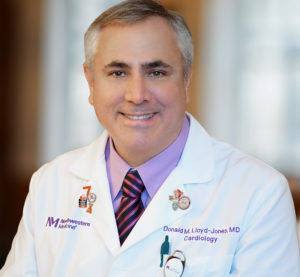
Starting cholesterol-lowering treatment earlier may increase its benefits, reducing heart attack and stroke over time, according to a Northwestern Medicine study published in the journal Circulation.
“We as clinicians, and especially people on the front lines in primary care, should be having these discussions with our patients much earlier than is the norm,” said Donald Lloyd-Jones, MD, the Eileen M. Foell Professor, chair of Preventive Medicine and a co-author of the study.
A variety of factors affect cholesterol levels, including existing health conditions, diet, weight, exercise, age, sex and genetics. According to current guidelines from the American Heart Association, adults over the age of 20 years should have their cholesterol levels checked every four to six years. For patients over the age of 40, physicians will also use an equation to estimate the patient’s 10-year risk of experiencing a heart attack or stroke.
Patients above the heart attack and stroke risk threshold tend to be above the ages of 50 and 60 years and commonly have additional risk factors that justify the need for cholesterol-lowering medication. While this is an effective way of selecting and treating patients who are at highest risk in the short-term, it also ignores one’s lifetime exposure to cholesterol, according to Lloyd-Jones.
“By waiting until later life, when people have accrued a lot of risk already, we may be missing an opportunity to prevent events that would happen earlier. We’re waiting until the biology is far down the road and we’re not intervening in a moment when it’s much easier to stop the process of plaque development,” said Lloyd-Jones, who is also a professor of Pediatrics and of Medicine in the Division of Cardiology.
To determine the optimal time to initiate the use of cholesterol lowering medication, the investigators used a public dataset representative of Americans aged 30 to 59 years who were not eligible for cholesterol-lowering treatment recommendations under the most recent U.S. guidelines.
The team then developed two predictive models to compare cholesterol lowering benefits: one where individuals between the ages of 30 to 39 are given cholesterol lowering medication over a thirty-year period, and the other where treatment for these individuals is delayed by 10 or 20 years.
By administering cholesterol lowering treatment earlier, the risk of heart attack and stroke for these could be reduced by as much as two-thirds. Rather than waiting 10, 20, or 30 years to begin treatment, patients could see as much as a 70 percent reduction in risk because the benefit would grow over time, according to Lloyd-Jones.
“This is not direct data on patients being treated, this is a simulation exercise, but clearly treating today versus not treating at all gives us some benefit and we think that benefit is bigger than has previously been appreciated,” Lloyd-Jones said.
Treating individuals at younger ages as they accumulate exposure to cholesterol and other cardiovascular risk factors over time would offer greater benefits, according to Lloyd-Jones, but would also be a significant paradigm shift to current clinical practice.
“We can’t ignore cholesterol levels in our twenties and thirties, and then suddenly think we can repair all that damage when somebody turns 50 just by prescribing a medication, so we need to get much more serious about the lifestyle issues earlier on to try to optimize patient’s cholesterol to as good as it can be,” Lloyd-Jones said.
This work was supported by the Doggone Foundation at the McGill University Health Center and the Research Institute of the McGill University Health Center.






